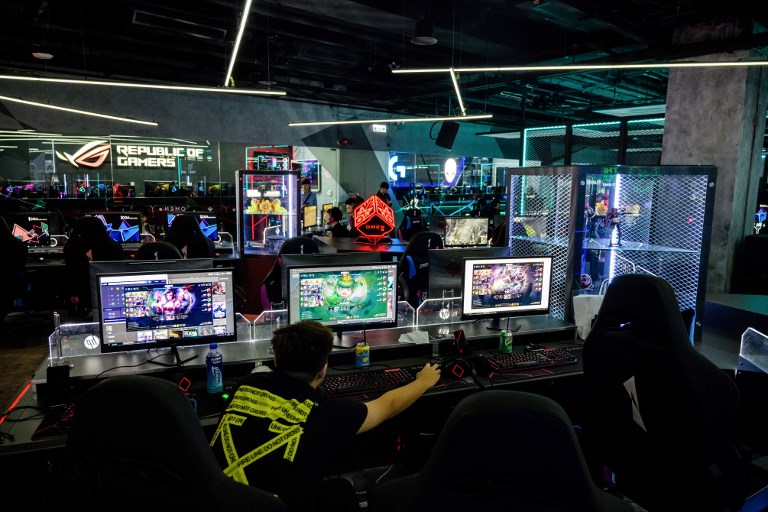
In this picture taken on January 29, 2019, a visitors uses a console at the Cyber Games Arena (CGA) eSports venue in the Mongkok district of Kowloon in Hong Kong. – At 25,000 square feet (2,322 sq. metres), the Cyber Games Arena (CGA) claims to be the largest integrated eSports stadium in Asia. (Photo by Anthony WALLACE / AFP)
eSports’ bid to reach the Olympics may be on hold but backing from big sponsors and a relentless march into the mainstream raise the question of whether it needs the Games at all.
With sportswear giant Nike last month announcing its sponsorship of China’s Legends Pro League, video gaming already bears the hallmarks of any successful sport.
Adidas, Mercedes and BMW are some of the other global brands to jump on board, while McDonald’s dropped its sponsorship of Germany’s national football team to focus on eSports.
The Legends Pro League, China’s official competition for the League of Legends game, has 14 regional divisions, and teams have their own home venues. The game also has an annual world championship.
As of next year, professional players will be fully decked out in Nike-designed jerseys and trainers, with an accompanying lifestyle range — much like any big football, basketball or baseball team.
“It’s (eSports) already hit mainstream, a couple of years back,” Philip So, who heads business development at League of Legends developer Riot Games, told AFP at last week’s Sportel convention in Macau.
“(But the Nike sponsorship) had a huge reaction from our fans when we announced it, even from the Nike side. I think it was surprising to everyone how much buzz it generated.”
A Goldman Sachs briefing in October said eSports was on course to reach nearly 300 million viewers by 2022 — similar numbers to American football’s NFL.
‘NBA didn’t need the Olympics’
Some are now beginning to wonder if the Olympics needs eSports more than the other way round, as the venerable institution dating back to the late 19th century strives to reach a younger audience.
“I think it would be great for the Olympic programme to have eSports because they are going to be able to capture the attention of a new audience that otherwise would disappear,” Maurizio Barbieri, Twitter’s Southeast Asian head of sports partnerships, said at Sportel.
“But overall, (how would the Olympics help eSports) in general?
“I mean, the NBA didn’t need the IOC (International Olympic Committee) to become the number one basketball league in the world.”
eSports won’t be part of the Olympics until at least Los Angeles 2028, after it was left off the list of nominated sports for Paris 2024 — which included the equally youth-friendly breakdancing, surfing, skateboarding and climbing.
But So said that when eSports was a demonstration event at last year’s Asian Games, viewing figures in China outstripped those of traditional sports, even though the competition wasn’t shown on TV.
People who play computer games, he added, are now proud to identify themselves as “gamers”, underlining the rise of a movement that has spread organically, from the grassroots up.
“It’s a complete paradigm shift. This is the time for gamers to come out. It’s revenge of the gamers,” said So.
Deeply fragmented
Much of the opposition to eSports is related to concerns over screen time and inactivity among young people, as well as a lack of knowledge and understanding of the games.
China has been particularly cautious, last year announcing curbs including temporarily suspending new releases of online games — sending shares plummeting in Tencent, Riot Games’ parent company.
But So said China’s sports ministry remained a supporter of eSports, drawing a distinction between professional, organized gaming and streaming, where amateurs play for audiences online.
“I don’t think eSports makes the government very nervous. I really don’t think so,” he said.
“Because the sports bureau etc, we work very closely with them and it’s definitely on their agenda and interest to grow the sport as well.”
However, So was at a loss to predict whether eSports would finally make it into the Olympics, a campaign that faces a number of hurdles.
As well as concerns over eSports’ lack of physical activity, the scene is deeply fragmented, as different games are made by competing studios. It is also yet to form a world governing body — a stipulation demanded by the IOC.
“I honestly don’t know. I wish I had the answer,” So said, when asked what was the way forward for eSports’ Olympic bid.
“How an overarching arm across all different games (would work), I’d be very curious to know,” he added.